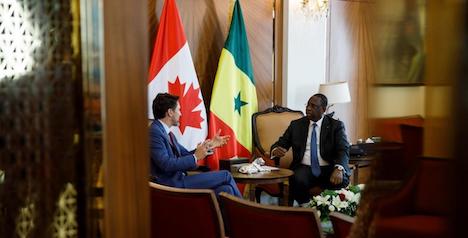|

|
Justin Trudeau lectures others about human rights while forgetting issues at home
 Print This Print This
By Monia Mazigh | Rabble.ca
Rabble.ca
Saturday, Feb 22, 2020
 |
| Image: Justin Twit on Twitter |
An old Arab proverb says "If a camel tries to look at its own hump, its neck might break." Basically, looking at one's own back (or own problems) might be painful, so instead many people decide to look away.
In his recent visit to African countries, Prime Minister Justin Trudeau has been trying to convince African leaders that Canada deserves their support. Observers note that African countries increasingly vote as a monolithic bloc in international bodies like the Francophonie, the United Nations and the Commonwealth -- hence the importance of Canada seeking their support in its bid for a seat at the UN Security Council.
In a revised memo obtained through an access to information request by Global News, the Liberal government has adopted two objectives, among others, for its foreign policy in sub-Saharan Africa: promoting human rights and inclusive governance, and supporting poverty reduction.
So, it comes as no surprise that Trudeau, while touring African countries, emphasized these two particular issues. Meanwhile at home, Trudeau's own record on these two objectives came to haunt him and perhaps damaged his carefully constructed image.
In Senegal, Trudeau boasted to journalists that he was "a great defender of human rights" (an insinuation that same-sex marriage is legalized in Canada whereas homosexuality is criminalized in Senegal).
In photo-ops, Trudeau was pictured at the House of Slaves on Gorée Island, a very emotionally and historically charged place where African slaves were shipped to America by European slave-merchants.
Similar places should be a strong reminder to Trudeau that slavery and colonialism were horrific acts of genocide, and that posing for photo-ops is obviously not enough.
While reminding Senegal President Macky Sall of the importance of human rights, Trudeau must have forgotten that in Wet'suwet'en territory in northern British Columbia, the militarized RCMP raided and arrested land defenders for peacefully opposing the construction of the Coastal GasLink pipeline that would run through unceded Wet'suwet'en territory.
On top of siding with corporate interests, the RCMP went even further by limiting and even threatening to arrest journalists who were trying to report on the situation. This is an affront to freedom and democracy in this country.
Unfortunately, this isn't a surprise. The RCMP, since its inception has had a long history of oppression and violence against Indigenous communities and other marginalized groups. Indeed, the creation of the RCMP by prime minister John A. Macdonald was mainly to "control" the Western part of Canada, and that meant fighting Indigenous resistance and establishing full control over the economic resources of the newly established country.
In former prime minister Stephen Harper's Bill C-51 (the Anti-terrorism Act), which was slightly amended by the current Liberal government, the activities of Indigenous and environmental activists were among many activities described as posing a threat to Canada's national security.
In 2016, the RCMP tracked 89 indigenous groups that were considered threats for participating in protests.
This week, the Assembly of the First Nations (AFN) launched a class-action lawsuit against the federal government because, they said, Indigenous children "have been discriminated against by the government's child welfare system." The AFN argues the federal government's actions increased Indigenous child poverty levels.
In 2016, the Canadian Human Rights Tribunal found the government systemically discriminated against on-reserve First Nations children by providing inadequate services.
So far, the government has already spent upwards of $8 million in legal fees in its efforts to fight the Canadian Human Rights Tribunal ruling, as documented by First Nations Child and Family Caring Society executive director Cindy Blackstock, who started the challenge years ago and has kept track of efforts by the government to fight the ruling.
Wouldn't it have been easier to pay these sums to the First Nations children so they can have decent schools like other children in Canada?
In a tweet this week, Trudeau wrote: "Every child, no matter who they are or where they live deserves to enjoy their childhood."
And what if the child is First Nations and living in Canada? Does this tweet apply to her? Or is it only when Trudeau comes to give lessons to other countries that we are champions?
Trudeau's diplomatic charm operation has so far cost $2 million, and there is no guarantee that Canada will end up getting the Security Council seat. Canada might lose the seat to one if its competitors, Norway and Ireland, who are doing much better respectively in terms of foreign aid and siding with the Palestinian cause. These issues matter tremendously to African countries, but Trudeau has kept silent on them or has at least shown he isn't ready to take a leading role on them.
Source URL
|
 Print This Print This

|
If you appreciated this article, please consider making a donation to Axis of Logic.
We do not use commercial advertising or corporate funding. We depend solely upon you,
the reader, to continue providing quality news and opinion on world affairs. Donate here
|
 |
World News

|

